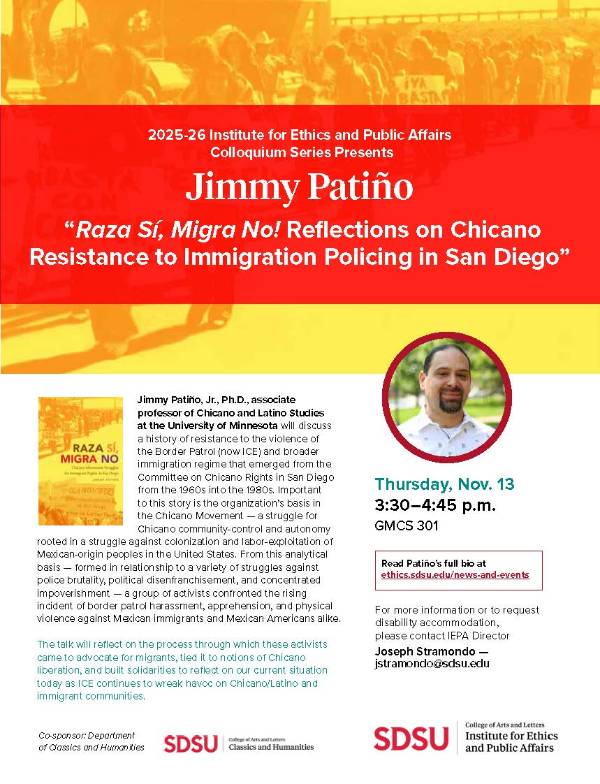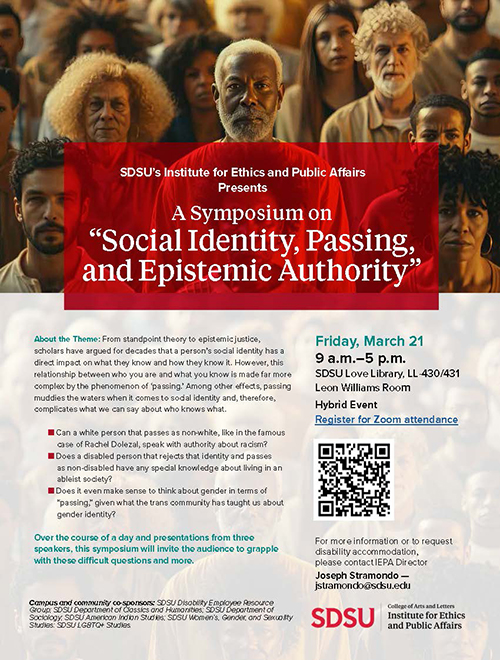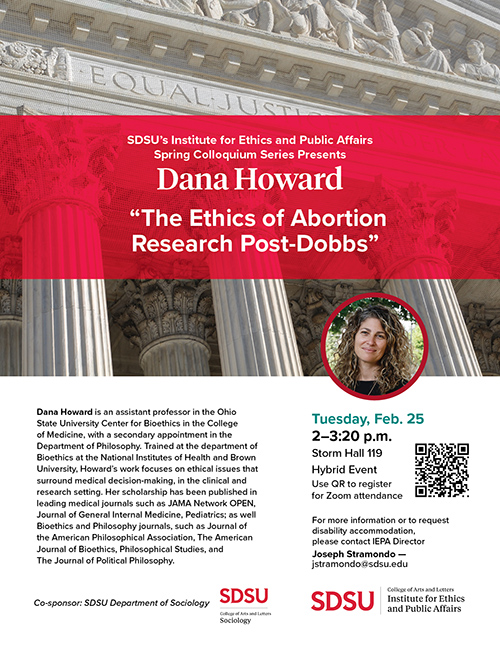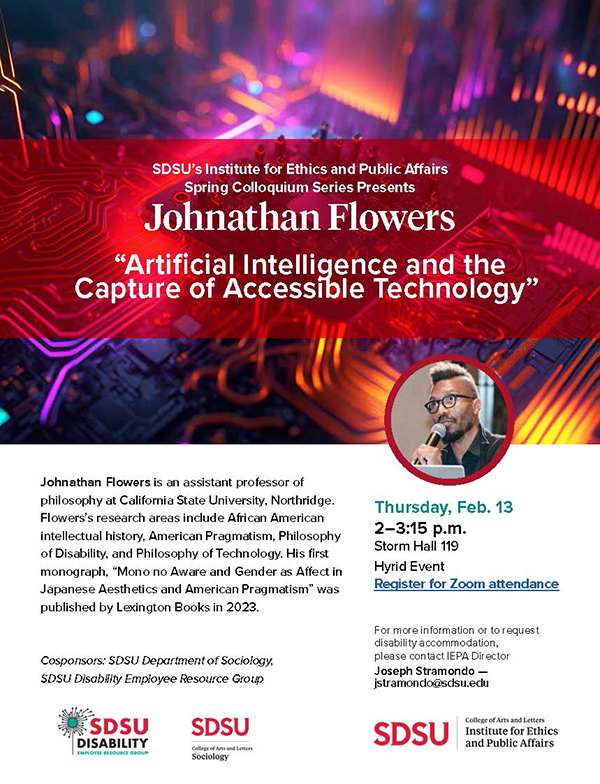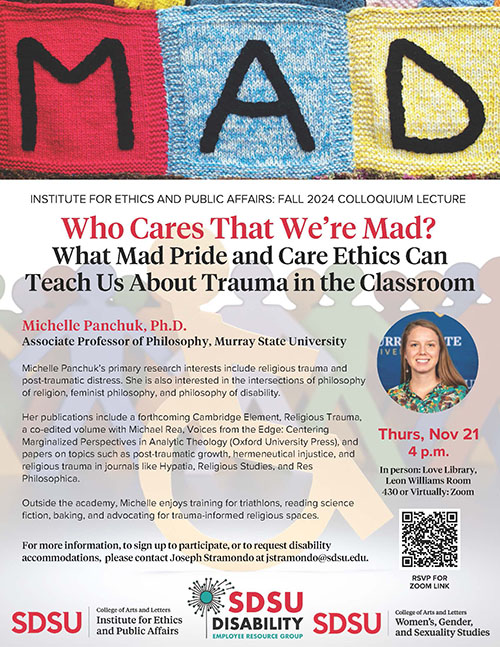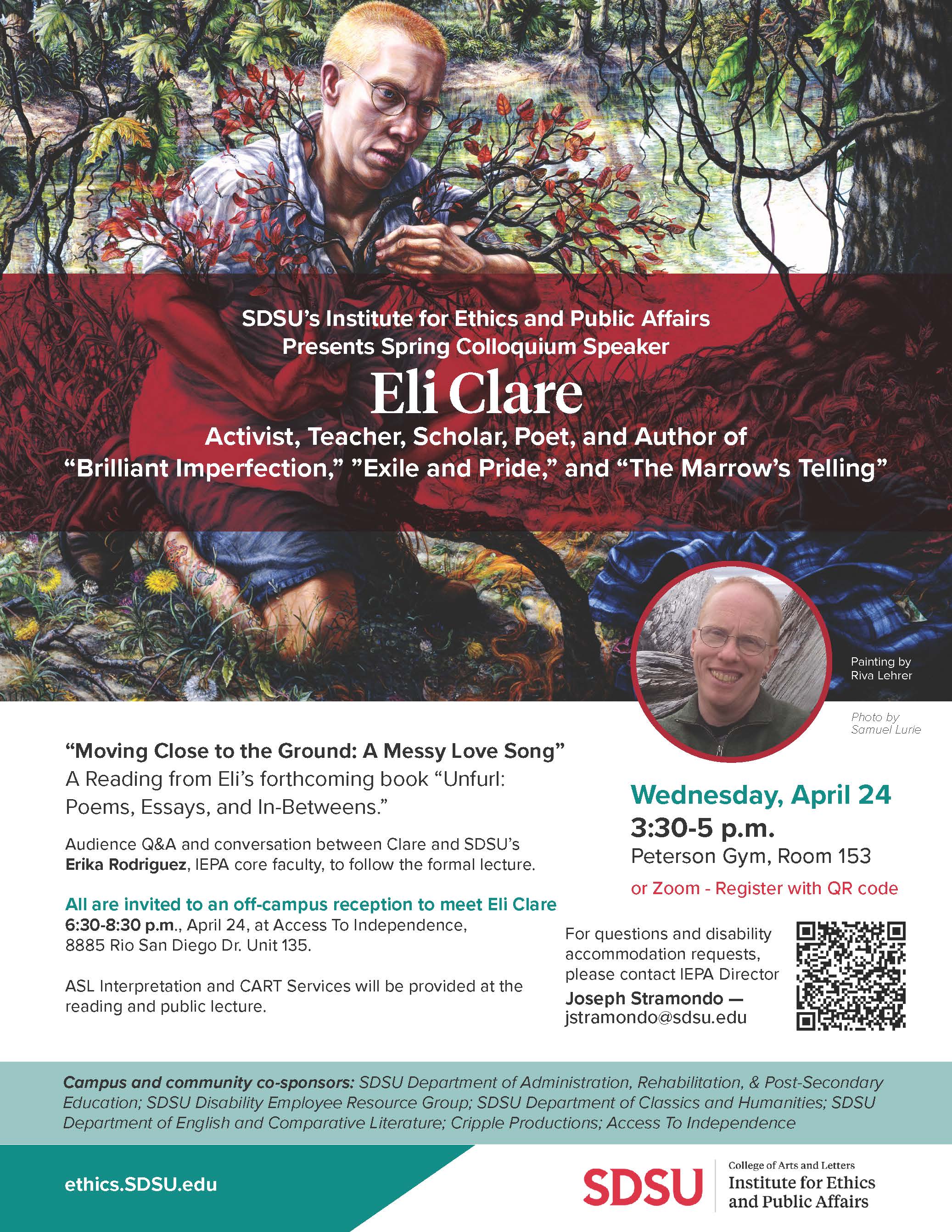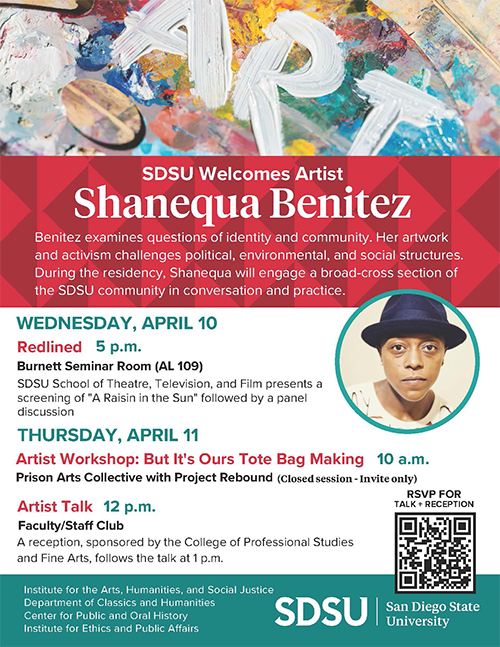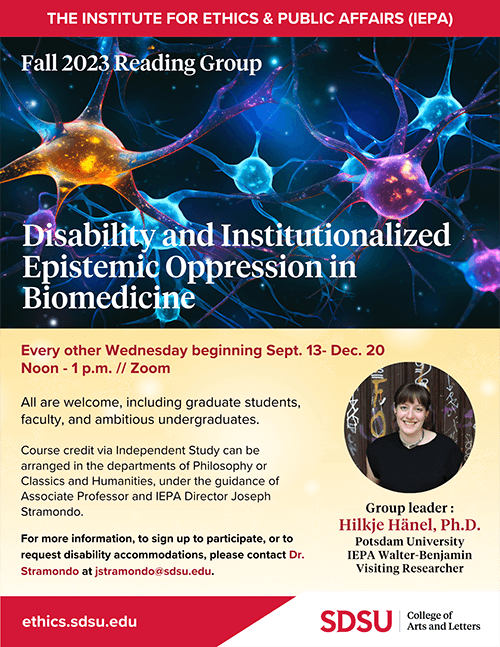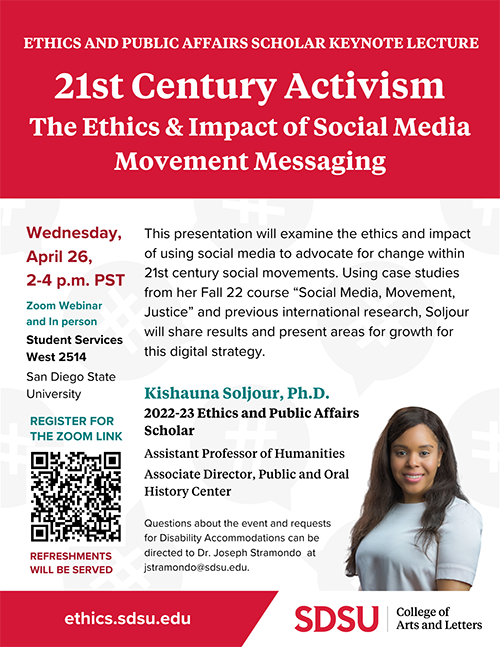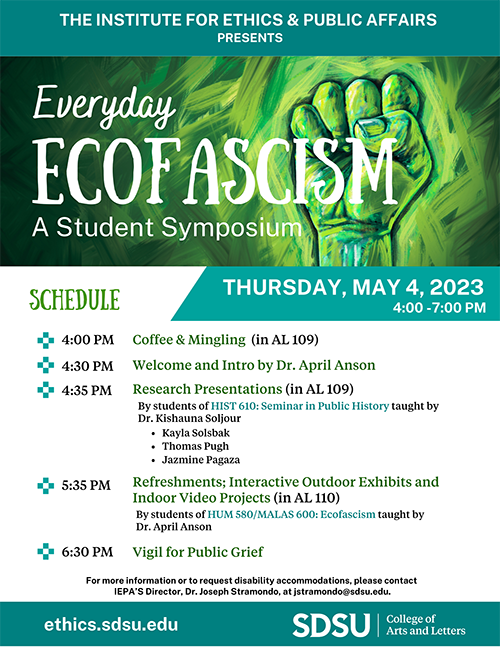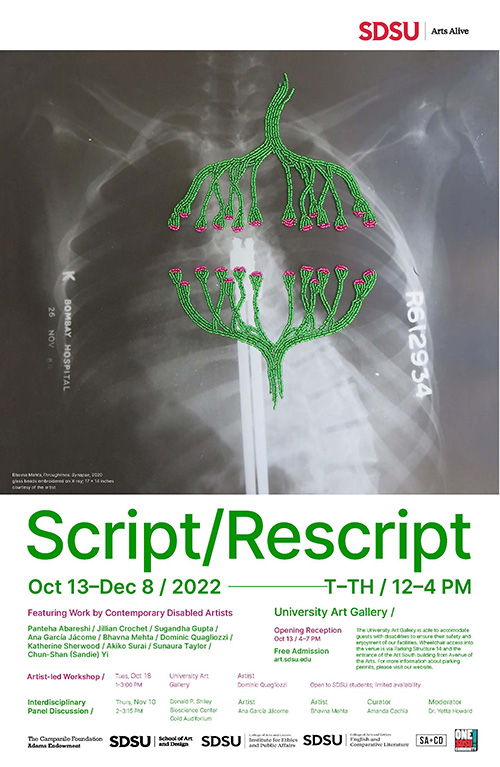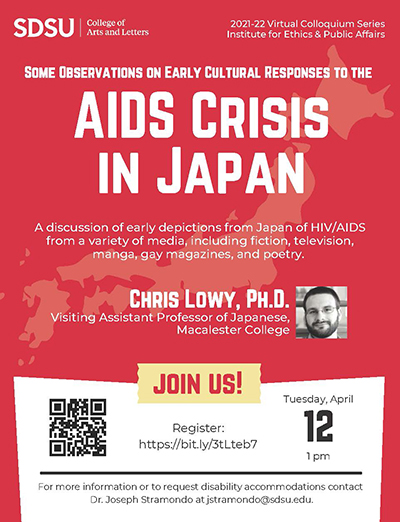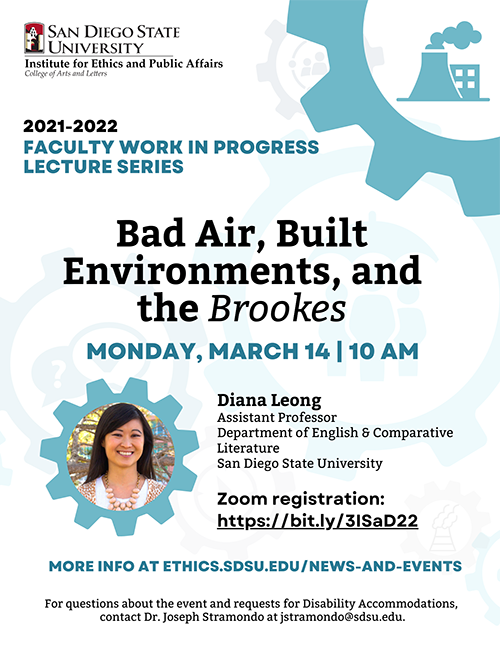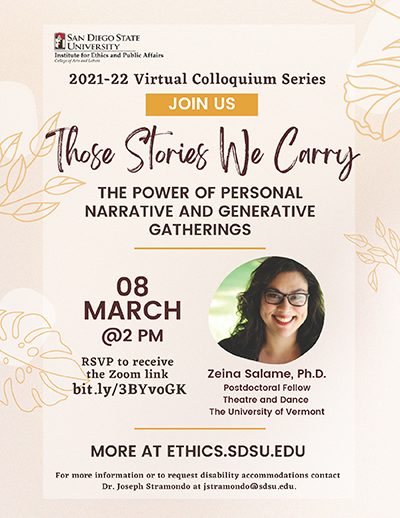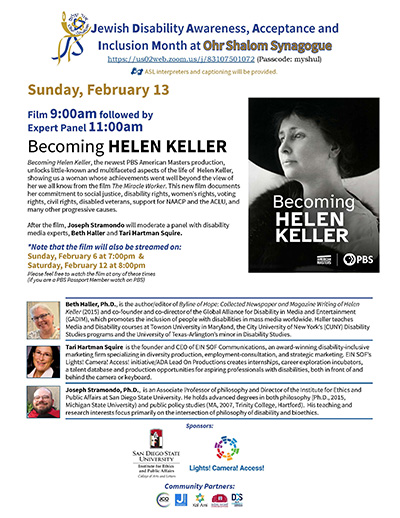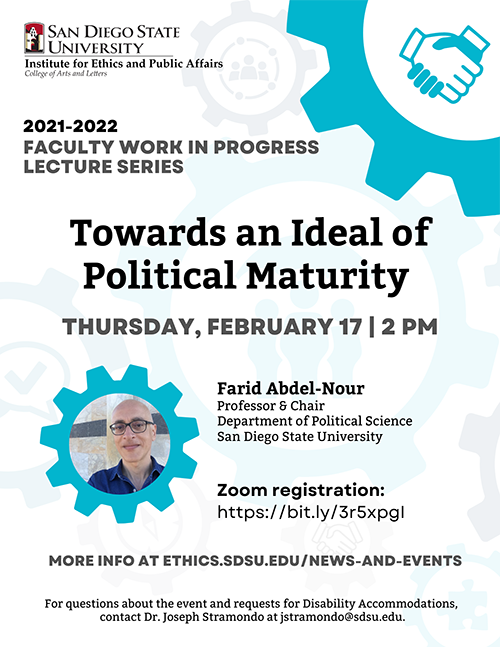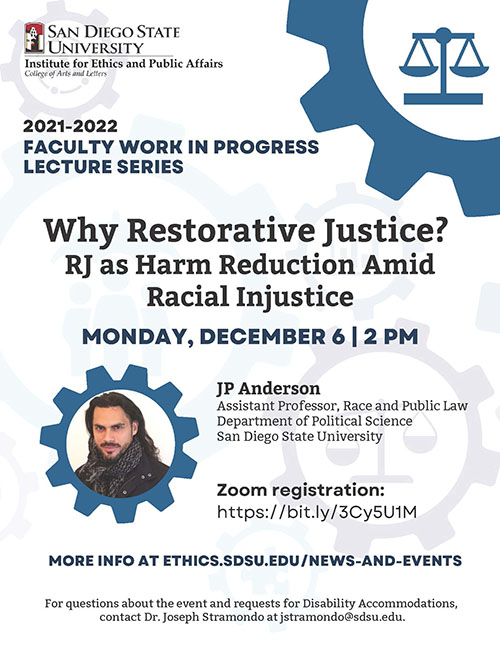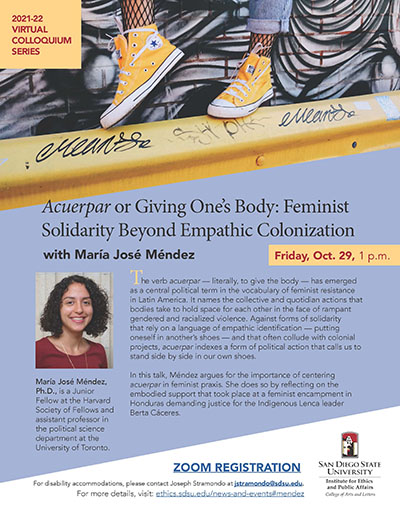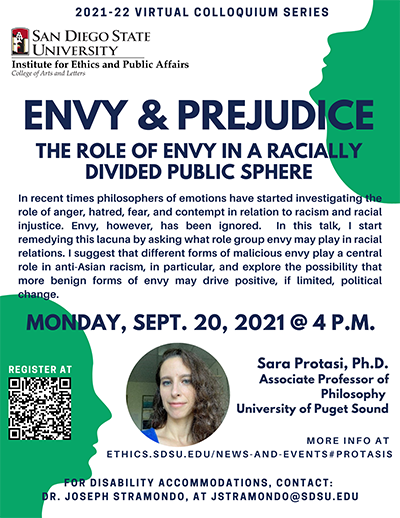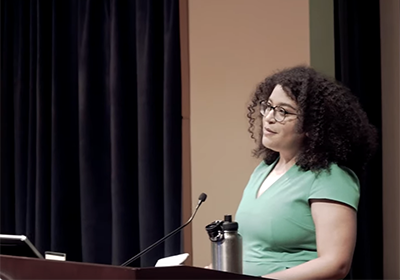News and Events
"Raza Sí, Migra No! Reflections on Chicano Resistance to Immigration Policing in San Diego"
Thursday, November 13, 2025
3:30-4:45pm
GMCS 301
Jimmy Patiño, Jr., Ph.D., will discuss a history of resistance to the violence of the Border Patrol (now ICE) and broader immigration regime that emerged from the Committee on Chicano Rights in San Diego from the 1960s into the 1980s. Important to this story is the organization’s basis in the Chicano Movement — a struggle for Chicano community-control and autonomy rooted in a struggle against colonization and labor-exploitation of Mexican-origin peoples in the United States. From this analytical basis — formed in relationship to a variety of struggles against police brutality, political disenfranchisement, and concentrated impoverishment — a group of activists confronted the rising incident of border patrol harassment, apprehension, and physical violence against Mexican immigrants and Mexican Americans alike.
The talk will reflect on the process through which these activists came to advocate for migrants, tied it to notions of Chicano liberation, and built solidarities to reflect on our current situation today as ICE continues to wreak havoc on Chicano/Latino and immigrant communities.
Jimmy Patiño is an associate professor and interdisciplinary historian in the Department of Chicano & Latino Studies at the University of Minnesota. He is the author of the book "Raza Sí, Migra No: Chicano Movement Struggles for Immigrant Rights in San Diego" published by the University of North Carolina Press in 2017. He has also written on Mexican American desegregation, Black and brown critical thought in hip-hop culture, and is currently writing on the Chicano movement of the 1960s and how these activists conceptualized and practiced relationship to Black and red power movements. Patiño teaches and mentors students in classes such as Chicano history, immigration and the Latinx experience, Chicano cultural studies, and comparative ethnic studies. He is an advocate for Chicano-Latinx history and broader ethnic studies in the K-12 system in Minnesota, developing curriculum, and co-creating collectives of mentorship and dialog with teachers, activists and students. He is also the current director of the Center for Race, Indigeneity, Disability, Gender and Sexuality Studies at the University of Minnesota. Patiño received a B.A. and M.A. in sociology from the University of Houston and a Ph.D. in United States history from the University of California, San Diego.
The Institute for Ethics and Public Affairs (IEPA) at SDSU seeks applicants for its Ethics and Public Affairs Scholar Program. The Ethics and Public Affairs Scholar will be a non-tenured, tenure track faculty member of SDSU’s College of Arts and Letters with an emerging record of outstanding scholarly or artistic achievement. Their research program or artistic trajectory will demonstrate substantial engagement with the ethical salience of some feature of public life (past awardees have focused on topics like climate change, political activism and social media, anti-racism, and more).
The Ethics and Public Affairs Scholar Program will provide support to this individual in the form of a summer salary grant of $4000 to allow them to further develop their projects in this area. Specifically, summer salary will be awarded to the Ethics and Public Affairs Scholar, which they will be expected to use over the summer of 2026 to complete some sort of research or artistic project that has direct bearing on moral problems that arise from current events in their historical or cultural contexts. During the next academic year after they are awarded this summer salary, the Ethics and Public Affairs Scholar will offer a public presentation of their project as part of the IEPA’s Faculty Colloquium Series.
As an interdisciplinary research center, we invite applicants who engage various analytical methods to grapple with ethical tensions at both theoretical and practical levels. However, all projects must be focused on addressing normative problems, rather than offering purely empirical descriptions. While we will consider projects addressing any normative question of public interest, projects engaging with the following three research areas, which are the focus of the IEPA, will be given priority:
- Environmental Ethics
- Bioethics
- Equity and Social Justice
To apply, please send the following to Dr. Joseph Stramondo ([email protected], Associate Professor of Philosophy & Humanities and Director of the IEPA) with the subject line “Ethics and Public Affairs Scholar Application” by October 1, 2025:
- A current Curriculum Vitae
- A one-paragraph statement describing how your research or artistic interests engage with questions regarding ethics and public life.
- A one-paragraph description of the project you would complete as an Ethics and Public Affairs Scholar
Archives
A Symposium on “Social Identity, Passing, and Epistemic Authority”
From standpoint theory to epistemic justice, scholars have argued for decades that a person's social identity has a direct impact on what they know and how they know it. However, this relationship between who you are and what you know is made far more complex by the phenomenon of 'passing.' Among other effects, passing muddies the waters when it comes to social identity and, therefore, complicates what we can say about who knows what. Can a white person that passes as non-white, like in the famous case of Rachel Dolezal, speak with authority about racism? Does a disabled person that rejects that identity and passes as non-disabled have any special knowledge about living in an ableist society? Does it even make sense to think about gender in terms of "passing," given what the trans community has taught us about gender identity? Over the course of a day and presentations from three speakers, this symposium will invite the audience to grapple with these difficult questions and more.
Friday, March 21, 9 a.m. - 5 p.m.
Hybrid Event: In person: Love Library LL-430 & LL-431 - Leon Williams & Library Presentation Rooms; Virtual
9–9:30 a.m. | Coffee and Welcome
9:30–11 a.m. | Dr. Talia Mae Bettcher, professor of philosophy, CSU Los Angeles (author of “Beyond Personhood: An Trans Philosophy”)
Commentator: Dr. Marie Draz, associate professor of women’s, gender, and sexuality studies, SDSU
11 a.m.–12:15 p.m. | Break/Lunch on your own
12:15–1:45 p.m. | Dr. Kim Tallbear, professor of native studies, University of Alberta; Canada research chair (CRC) in Indigenous peoples, technoscience, and society (author of “Native American DNA: Tribal Belonging and the False Promise of Genetic Science”)
Commentator: Dr. Olivia Chilcote, associate professor of American Indian studies, SDSU
1:45–2 p.m. | Break
2–3:30 p.m. | Dr. Jeffrey Brune, associate professor of history, Gallaudet University (editor of Disability and Passing: Blurring the Lines of Identity; editor-in-chief of Disability Studies Quarterly)
Commentator: Dr.Jess Whatcott, assistant professor of women’s, gender, and sexuality
studies, SDSU
3:30-4 p.m. | Panel — All Speakers
4-5 p.m. | Reception (light refreshments)
Co-Sponsoring Units: SDSU Department of Sociology; SDSU Disability Employee Resource Group; SDSU Department of American Indian Studies; SDSU Department of Women’s, Gender, and Sexuality Studies; SDSU LGBTQ+ Program
For questions and requests for disability accommodations, contact Dr. Joseph Stramondo at [email protected].
IEPA Director Quoted in a Trump and Disability Article
IEPA’s Director, Joseph Stramondo, was interviewed by The Nation for its article “Donald Trump’s Next Diversity Target: People with Disabilities.” The article discusses how President Trump’s policies have endangered the rights of disabled individuals in the U.S. through his attacks on diversity, equity, and inclusion (DEI) programs. His administration has targeted programs to enhance the inclusion and accessibility of people with disabilities, including those in federal employment and education. These actions threaten decades of progress under the Americans with Disabilities Act and other policies. The article highlights the risk of cuts to essential services such as Medicaid, which many disabled people rely on, warning that these moves could have catastrophic consequences for the disability community.
Spring Colloquium Lecture: The Ethics of Abortion Research Post-Dobbs
Dana Howard, Ph.D.
Assistant Professor, Ohio State University College of Medicine
Tuesday, February 25
2-3:20 p.m.
In person: Storm Hall 113
Virtually: Zoom
RSVP for Zoom Link for 2/25
Dana Howard is an assistant professor in the Ohio State University Center for Bioethics in the College of Medicine, with a secondary appointment in the Department of Philosophy. Trained at the department of Bioethics at the National Institutes of Health and Brown University, Howard’s work focuses on ethical issues that surround medical decision-making, in the clinical and research setting. Her scholarship has been published in leading medical journals such as JAMA Network OPEN, Journal of General Internal Medicine, Pediatrics; as well Bioethics and Philosophy journals, such as Journal of the American Philosophical Association, The American Journal of Bioethics, Philosophical Studies, and The Journal of Political Philosophy.
For more information, to sign up to participate, or to request disability accommodations, please contact Joseph Stramondo at [email protected].
Co-sponsered by the SDSU Department of Sociology
Spring Colloquium Lecture: Artificial Intelligence and the Capture of Accessible Technology
Johnathan Flowers, Ph.D.
Assistant Professor, Philosophy, California State University, Northridge
Thursday, February 13
2–3:15 p.m.
In person: Storm Hall 119
Virtually: Zoom
RSVP for Zoom Link for 2/13
Johnathan Flowers is an assistant professor of philosophy at California State University, Northridge. Flowers’s research areas include African American intellectual history, American Pragmatism, Philosophy of Disability, and Philosophy of Technology. His first monograph, “Mono no Aware and Gender as Affect in Japanese Aesthetics and American Pragmatism” was published by Lexington Books in 2023.s spaces.
For more information, to sign up to participate, or to request disability accommodations, please contact Joseph Stramondo at [email protected].
Co-sponsered by the SDSU Department of Sociology and SDSU Disability Employee Resource Group
2024-2025 Ethics and Public Affairs Scholar
The Institute for Ethics and Public Affairs is pleased to announce Dr. Lashon Daley as the 2024-2025 Ethics and Public Affairs Scholar. Daley is an assistant professor in the Department of English & Comparative Literature. Daley’s research showcases the important role that the tokenization of Black girlhood plays in the US’s visual economy, specifically the visual, social, and financial gains of showcasing Black girlhood as a sign of racial progress and social justice. As a fellow with the Institute for Ethics and Public Affairs, Daley will be drafting the fourth chapter of their academic monograph, "The Token Ones: The Visual Economy of Black Girlhood in Contemporary US Culture," which documents the tokenistic value of Black girlhood in media, including children’s and adolescent literatures, film, television, social media, and doll production. Daley’s fourth chapter, She Also Comes in Black, focuses on Disney’s desire to recast popular films about white girlhood with Black lead actors. From "Pollyanna" (1960) to "The Little Mermaid" (2023), this chapter investigates how Disney films reify white girlhood as the cultural standard, and Black girlhood as the token. Daley’s work has appeared in Meridians, Meridians: feminism, race, transnationalism, and Signs: Journal of Women in Culture and Society.
Fall 2024 Colloquium Lecture: Who Cares That We’re Mad? What Mad Pride and Care Ethics Can Teach Us About Trauma in the Classroom
Michelle Panchuk, Ph.D.
Associate Professor of Philosophy, Murray State University
Thursday, November 21 | 4 p.m.
In person: Love Library, Leon Williams Room 430 or Virtually: Zoom
RSVP for Zoom Link
Michelle Panchuk’s primary research interests include religious trauma and post-traumatic distress. She is also interested in the intersections of philosophy of religion, feminist philosophy, and philosophy of disability.
Her publications include a forthcoming Cambridge Element, Religious Trauma, a co-edited volume with Michael Rea, Voices from the Edge: Centering Marginalized Perspectives in Analytic Theology (Oxford University Press), and papers on topics such as post-traumatic growth, hermeneutical injustice, and religious trauma in journals like Hypatia, Religious Studies, and Res Philosophica.
Outside the academy, Michelle enjoys training for triathlons, reading science fiction, baking, and advocating for trauma-informed religious spaces.
For more information, to sign up to participate, or to request disability accommodations, please contact Joseph Stramondo at [email protected].
Proudly co-sponsored with the SDSU Disability Employee Resource Group and the Department of Women's, Gender, and Sexuality Studies
Call for Proposals: Ethics and Public Affairs Scholar Program
The Institute for Ethics and Public Affairs (IEPA) at SDSU seeks applicants for its Ethics and Public Affairs Scholar Program. The Ethics and Public Affairs Scholar will be a non-tenured, tenure track faculty member of SDSU’s College of Arts and Letters with an emerging record of outstanding scholarly or artistic achievement. Their research program or artistic trajectory will demonstrate substantial engagement with the ethical salience of some feature of public life (past awardees have focused on topics like climate change, political activism and social media, anti-racism, and more).
The Ethics and Public Affairs Scholar Program will provide support to this individual in the form of assigned time to allow them to further develop their projects in this area. Specifically, three units of assigned time will be awarded to the Ethics and Public Affairs Scholar, which they will be expected to use over one semester to complete some sort of research or artistic project that has direct bearing on moral problems that arise from current events in their historical or cultural contexts. During the same academic year as they are awarded this assigned time, the Ethics and Public Affairs Scholar will offer a public presentation of their project as part of the IEPA’s Faculty Work in Progress Series.
As an interdisciplinary research center, we invite applicants who engage various analytical methods to grapple with ethical tensions at both theoretical and practical levels. However, all projects must be focused on addressing normative problems, rather than offering purely empirical descriptions. While we will consider projects addressing any normative question of public interest, projects engaging with the following three research areas, which are the focus of the IEPA, will be given priority:
- Environmental Ethics
- Bioethics
- Equity and Social Justice
To apply, please send the following to Dr. Joseph Stramondo ([email protected], Associate Professor of Philosophy & Humanities and Director of the IEPA) with the subject line “Ethics and Public Affairs Scholar Application” by October 11, 2024:
- A current Curriculum Vitae.
- A one-paragraph statement describing how your research or artistic interests engage with questions regarding ethics and public life.
- A one-paragraph description of the project you would complete as an Ethics and Public Affairs Scholar.
“Moving Close to the Ground: A Messy Love Song”
A Reading from Eli’s forthcoming book "Unfurl: Poems, Essays, and In-Betweens"
Featuring: Eli Clare, Activist, Teacher, Scholar, Poet, and Author of “Brilliant Imperfection,” ”Exile and Pride,” and “The Marrow’s Telling”
Wednesday, April 24
3:30-5 p.m.
In person: Peterson Gym, Room 153 or Virtual: Register for Zoom link
Audience Q&A and conversation between Clare and SDSU’s Erika Rodriguez, IEPA core faculty, to follow the formal lecture.
All are invited to an off-campus reception to meet Eli Clare
6:30-8:30 p.m., April 24, at Access To Independence, 8885 Rio San Diego Dr. Unit 135.
ASL Interpretation and CART Services will be provided at the reading and public lecture.
Campus and community co-sponsors: SDSU Department of Administration, Rehabilitation, & Post-Secondary Education; SDSU Disability Employee Resource Group; SDSU Department of Classics and Humanities; SDSU Department of English and Comparative Literature; Cripple Productions; Access To Independence
For questions and disability accommodation requests, please contact IEPA Director Joseph Stramondo — [email protected].
SDSU Welcomes Artist Shanequa Benitez
Benitez examines questions of identity and community. Her artwork and activism challenges political, environmental, and social structures. During the residency, Shanequa will engage a broad-cross section of the SDSU community in conversation and practice.
Wednesday, April 10
Redlined
5 p.m.
Burnett Seminar Room (AL 109)
SDSU School of Theatre, Television, and Film presents a screening of "A Raisin in the Sun" followed by a panel discussion.
Thursday, April 11
Artist Workshop: But It's Ours Tote Bag Making
10 a.m.
Prison Arts Collective with Project Rebound (Closed session - Invite only)
Artist Talk + Reception
12 p.m.
Faculty/Staff Club
A reception, sponsored by the College of Professional Studies and Fine Arts, follows the talk at 1 p.m.
RSVP for the Talk + Reception
Sponsored by Institute for the Arts, Humanities, and Social Justice, the Department of Classics and Humanities, the Center for Public and Oral History, and the Institute for Ethics and Public Affairs.
Fall 2023 Reading Group: "Disability and Institutionalized Epistemic Oppression in Biomedicine"
The Institute for Ethics and Public Affairs (IEPA) is pleased to announce a newly forming reading group lead by Visiting Researcher, Dr. Hilkje Hänel. Dr. Hänel is an Assistant Professor at Potsdam University, but currently on leave to serve as a Walter-Benjamin Researcher here at SDSU's IEPA.
The Institute for Ethics and Public Affairs (IEPA) is pleased to announce a newly forming reading group lead by Visiting Researcher, Dr. Hilkje Hänel. Dr. Hänel is an Assistant Professor at Potsdam University, but currently on leave to serve as a Walter-Benjamin Researcher here at SDSU's IEPA.
The reading group will meet from noon to 1pm on Wednesdays twice a month via Zoom. All are welcome, including grad students, faculty, and ambitious undergraduates. Course credit via Independent Study can be arranged in the departments of Philosophy or Classics and Humanities, under the guidance of Associate Professor and IEPA Director Joseph Stramondo.
For more information, to sign up to participate, or to request disability accommodations, please contact Dr. Stramondo via email at [email protected].
Call for Proposals" Curriculum Development Grant in Bioethics and Health Humanities
The Institute for Ethics and Public Affairs (IEPA) at SDSU seeks applicants to receive funding for developing university curriculum in the area of bioethics and health humanities (broadly construed to include topics of environmental justice, disability studies, animal ethics, and more). Applicants can be any faculty member of any rank (including non-tenure track lecturers) at SDSU with a record of outstanding teaching excellence and the necessary expertise in bioethics and health humanities. Their research program, artistic body of work, or teaching record must demonstrate substantial engagement with ethical issues within and/or human expression regarding the life sciences and/or biomedicine.
The Institute will provide support to this individual in the form of a stipend of $4000 to be used over the summer and during the 23-24 Academic Year to develop and successfully propose at least one new course that has direct bearing on the moral, social, political, historical, and/or cultural analysis of the life sciences and/or biomedicine.
As an interdisciplinary research center, we invite applicants who engage various analytical methods to grapple with these questions at both theoretical and practical levels.
To apply, please send the following to Dr. Joseph Stramondo ([email protected], Associate Professor of Philosophy and Director of the IEPA) with the subject line “Curriculum Development Grant Application” by Friday May 19, 2022:
- A current Curriculum Vitae
- A one-paragraph statement describing how your research program, artistic body of work, or teaching record demonstrates substantial engagement with ethical issues within and/or human expression regarding the life sciences and/or biomedicine.
- A one-paragraph description of the course you would develop if selected for this grant opportunity
21st Century Activism: The Ethics & Impact of Social Media Movement Messaging
Ethics and Public Affairs Scholar Keynote Lecture with Dr. Kishauna Soljour, 2022-23 Ethics and Public Affairs Scholar
Wednesday, April 26, 2-4 p.m. PST
Zoom Webinar and In person
Student Services West 2514
Register for the Zoom link
Refreshments will be served
This presentation will examine the ethics and impact of using social media to advocate for change within 21st century social movements. Using case studies from her Fall 22 course “Social Media, Movement, Justice” and previous international research, Soljour will share results and present areas for growth for this digital strategy.
Dr. Kishauna Soljour is an Assistant Professor of Humanities and the Associate Director of the Public and Oral History Center at SDSU. She specializes in Public Humanities and African Diaspora Studies. Soljour was a former Andrew W. Mellon Public Humanities Fellow and Visiting Assistant Professor of History at Sarah Lawrence College. Her book manuscript entitled "Beyond the Banlieue: French Postcolonial Migration & the Politics of a Sub-Saharan Identity" examines cultural, political, and social change for Diasporic communities in the twentieth and twenty-first centuries with a particular emphasis on the relationship between oral histories and protest movements.
For more information or to request disability accommodations, please contact IEPA’S Director, Dr. Joseph Stramondo, at [email protected].
Everyday Ecofascism: A Student Symposium
Thursday, May 4, 2023
4-7 PM
Refreshments will be served
4 PM Coffee & Mingling (in AL 109)
4:30 PM Welcome and Intro by Dr. April Anson
4:35 PM Research Presentations (in AL 109)
By students of HIST 610: Seminar in Public History taught by Dr. Kishauna Soljour
- Kayla Solsbak
- Thomas Pugh
- Jazmine Pagaza
5:35 PM Refreshments; Interactive Outdoor Exhibits and Indoor Video Projects (in AL 110)
By students of HUM 580/MALAS 600: Ecofascism taught by Dr. April Anson
6:30 PM Vigil for Public Grief
For more information or to request disability accommodations, please contact IEPA’S Director, Dr. Joseph Stramondo, at [email protected].
Watch video projects and see photos from the event.
SDSU Ethics Bowl Team Gives Top Performance at Regional Contest
It was a second-place finish for the first-time competitors; next they head to the national competition in spring.
December 7, 2022
SDSU's Ethics Bowl team, sponsored by the Institute for Ethics and Public Affairs (IEPA) and coached by Department of Philosophy Lecturer Shelley Dedman, was runner-up this past weekend at the California Regional Ethics Bowl Competition at UC Santa Cruz. They came in second place after making it to the final round, where they lost a close match to Stanford University's team. With 18 teams at the competition, SDSU's performance was quite impressive.
This was SDSU's first time joining the top four in the regional competition, earning them an automatic bid to compete at nationals in the spring. This was also SDSU's first time making it to the semifinals and the final round.
The national competition will be held in early March at the University of Portland. This will be SDSU's first appearance at the national level.
Even more impressive is that the team is composed of all rookie competitors, so this second-place finish resulted from their first time at the competition. Team Members included: Aidan Cumbo, Lena Albatro, Jacob Maldonado, Ian Paulino, and Lauren Payne. Congratulations to SDSU's Ethics Bowl team and Coach Dedman!
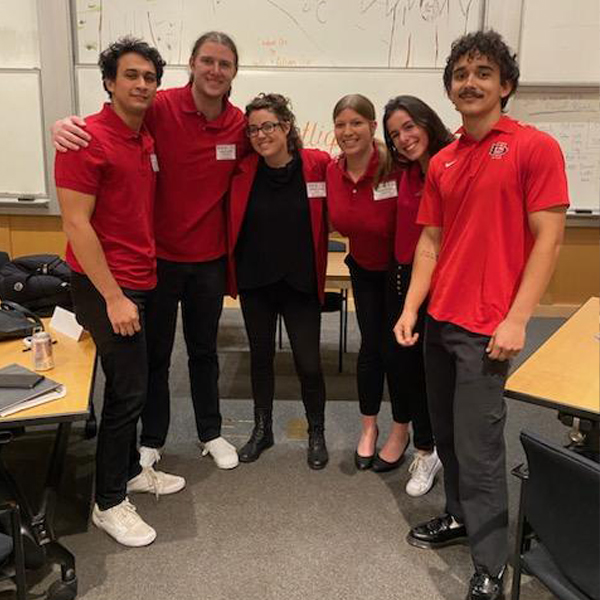
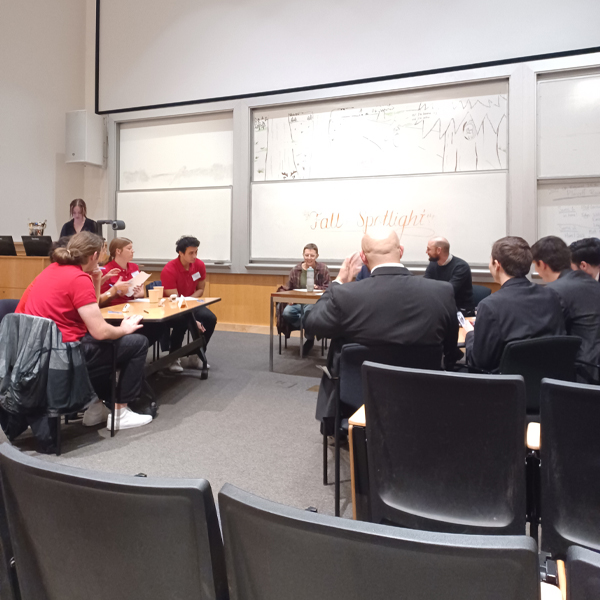
New Ethics and Public Affairs Scholar
Please join us in congratulating this year’s IEPA Ethics and Public Affairs Scholar, Dr. Kishauna E. Soljour. Dr. Soljour is an Assistant Professor in the Department of Classics and Humanities and serves as the Associate Director of SDSU’s Center for Public and Oral History.
Dr. Soljour will receive a course release and plans to use it to further develop the concept of “Millennial Oral History,” which she examines in her book project. She will accomplish this by using the assigned time to help the students in her current Fall 22 course “Social Media, Movement, Justice” to develop poster presentations for the Student Research Symposium, showing the results of their social media portfolios. She will also write a scholarly article discussing the pedagogical process of combining research with a social media application.
"Settler Memory: The Disavowal of Indigeneity and the Politics of Race in the United Statest"
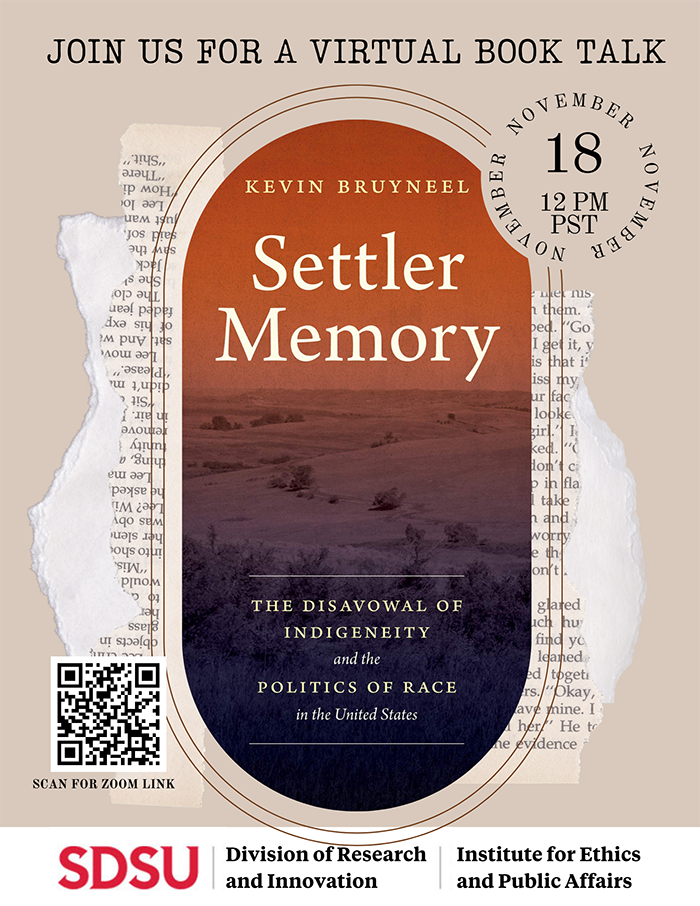 with Dr. Kevin Bruyneel
with Dr. Kevin Bruyneel
Nov. 18 | 12 p.m. PST | via Zoom
Faint traces of Indigenous people and their histories abound in American media, memory, and myths. Indigeneity often remains absent or invisible, however, especially in contemporary political and intellectual discourse about white supremacy, anti-Blackness, and racism in general. In this ambitious new book, Kevin Bruyneel confronts the chronic displacement of Indigeneity in the politics and discourse around race in American political theory and culture, arguing that the ongoing influence of settler-colonialism has undermined efforts to understand Indigenous politics while also hindering conversation around race itself. By reexamining major episodes, texts, writers, and memories of the political past from the seventeenth century to the present, Bruyneel reveals the power of settler memory at work in the persistent disavowal of Indigeneity. He also shows how Indigenous and Black intellectuals have understood ties between racism and white settler memory, even as the settler dimensions of whiteness are frequently erased in our discourse about race, whether in conflicts over Indian mascotry or the white nationalist underpinnings of Trumpism.
Envisioning a new political future, Bruyneel challenges readers to refuse settler memory and consider a third reconstruction that can meaningfully link antiracism and anticolonialism."
Sponsored by SDSU Division of Research and Innovation and the Institute for Ethics and Public Affairs.
"Disability and Japanese Video Games"
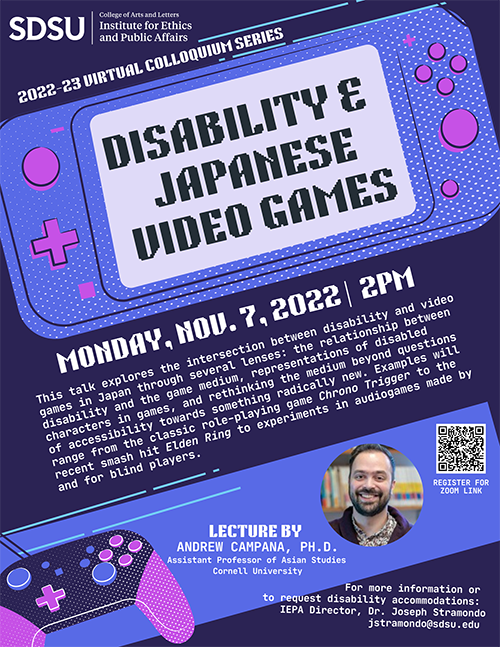 with Andrew Campana, Assistant Professor of Asian Studies, Cornell University
with Andrew Campana, Assistant Professor of Asian Studies, Cornell University
Monday, Nov. 7 | 2 p.m. | Register for Zoom link
This talk will explore the intersection between disability and video games in Japan through several lenses: the relationship between disability and the game medium, representations of disabled characters in games, and rethinking the medium beyond questions of accessibility towards something radically new. Examples will range from the classic role-playing game Chrono Trigger to the recent smash hit Elden Ring to experiments in audiogames made by and for blind players.
Andrew Campana is an Assistant Professor in the Department of Asian Studies at Cornell University. He is a scholar of modern and contemporary Japanese literature and media. His research centers on exploring moments of media transition, focusing in particular on poetry, digital media, and disability. In his current book project on Japanese poetry across media, he engages with expanded poetic practice from the 1920s to the present as a site where poets in Japan embraced and grappled with new media technologies like film, tape recording, television, and the internet. He is also working on a second project—on questions of digitality in electronic literature, video games, and disability arts in contemporary Japan—drawing from his experiences as part of the Trope Tank at MIT, a lab dedicated to developing new understandings of computation and literary practice.
Part of the 2022-23 Virtual Colloquium Series
For more information or to request disability accommodations: Please contact the IEPA’S Director, Dr. Joseph Stramondo, at [email protected]
Script/Rescript
On view October 13 – December 8, 2022
University Art Gallery
Tuesday – Thursday from 12:00 – 4:00 p.m. and by appointment
Script/Rescript features the artwork of ten artists who use historical and contemporary medicalizing scripts of their own bodies to colorfully rescript – or rewrite – visual language attributed to individual conditions of disability. An X-ray, a prosthesis, a cane, a crutch, a pill, a wheelchair tire, and a syringe are among the foundations on which to build new creative layers of empowered self-described embodiment. The work in this exhibition conveys disabled identity via new mapping, through-lines and mark-making, wherein the artists reject pathological archives by injecting their medical histories with memories, lived experiences, and sensorial attributes.
Script/Rescript is organized by the SDSU Art Galleries Program. The exhibition is curated by Lecturer Amanda Cachia in conjunction with Art 591: Gallery Exhibition Design. Script/Rescript and related events are sponsored by the School of Art and Design, the College of Professional Studies and Fine Arts, the Institute for Ethics and Public Affairs, the Department of English and Comparative Literature, Arts Alive SDSU, and One SDSU Community.
"A Field Guide to Climate Anxiety: How to Keep Your Cool on a Warming Planet"
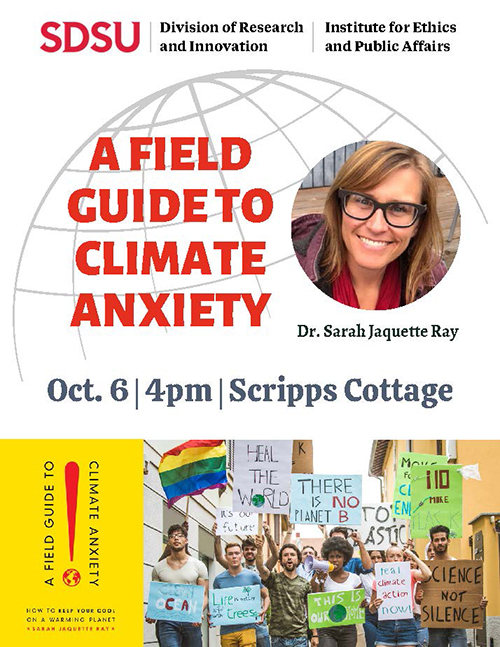 with Dr. Sarah Jacquette Ray
with Dr. Sarah Jacquette Ray
Oct. 6 | 4 p.m. | Scripps Cottage
""A youth movement is reenergizing global environmental activism. The 'climate generation'—late millennials and iGen, or Generation Z—is demanding that policy makers and government leaders take immediate action to address the dire outcomes predicted by climate science. Those inheriting our planet’s environmental problems expect to encounter challenges, but they may not have the skills to grapple with the feelings of powerlessness and despair that may arise when they confront this seemingly intractable situation. Drawing on a decade of experience leading and teaching in college environmental studies programs, Sarah Jaquette Ray has created an 'existential tool kit' for the climate generation. Combining insights from psychology, sociology, social movements, mindfulness, and the environmental humanities, Ray explains why and how we need to let go of eco-guilt, resist burnout, and cultivate resilience while advocating for climate justice. A Field Guide to Climate Anxiety is the essential guidebook for the climate generation—and perhaps the rest of us—as we confront the greatest environmental threat of our time."
Sponsored by SDSU Division of Research and Innovation and the Institute for Ethics and Public Affairs.
Check out the new web zine and teaching resource, Against the Ecofascist Creep.
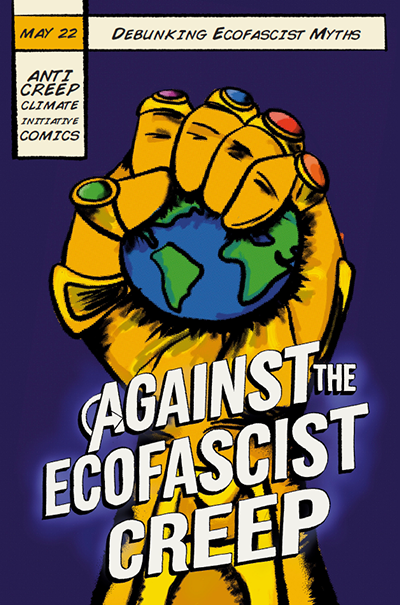 The zine exposes and debunks six "everyday ecofascist" myths.
The zine exposes and debunks six "everyday ecofascist" myths.
This cross-disciplinary resource is the work of
- April Anson (SDSU),
- Cassie Galentine (University of Oregon),
- Shane Hall (Salisbury University),
- Alex Menrisky (University of Connecticut), and
- Bruno Seraphin (Cornell University).
And features the graphic design brilliance of SDSU grad student Melody Keenan.
The full zine is available at the Association for the Study of Literature and Environment’s (ASLE) Teaching Resources Database.
Call for Proposals: Ethics and Critical Disability Studies Summer Research Award
The Institute for Ethics and Public Affairs (IEPA) at SDSU seeks teams of applicants for an Ethics and Critical Disability Studies Summer Research Award. The winning team will be comprised of a faculty member at SDSU and a graduate student who share a common research interest in the ethical dimensions of critical disability studies. The faculty mentor will show evidence of outstanding scholarly or artistic achievement in critical disability studies and the student mentee will show promise in this area.
The Ethics and Critical Disability Studies Summer Research Award will provide support to this team in the form of a summer research stipend that is to be used to further develop their projects in this area. Specifically, the graduate student will be awarded a direct payment of $4000.00 and the faculty mentor will receive $1,000.00. In turn, the team will be expected to use these funds as summer salary to develop a research or artistic project that has direct bearing on questions of ethical import in the field of critical disability studies. As part of the IEPA’s 2022-23 speaker series, the winning team will be invited publicly present the results of their efforts.
As an interdisciplinary research center, we invite applicants who engage various analytical methods to grapple with ethical tensions at both theoretical and practical levels. However, all projects must be focused on addressing questions of value (moral, political, legal, aesthetic, etc), rather than offering purely empirical descriptions. While we will consider projects addressing any ethical question in critical disability studies, projects intersecting with the following three research areas, which are the focus of the IEPA, will be given priority:
- Environmental Ethics
- Bioethics
- Equity and Social Justice
To apply, please send the following to Dr. Joseph Stramondo ([email protected], Associate Professor of Philosophy and Director of the IEPA) with the subject line “Ethics and Critical Disability Studies Summer Research Award” by Monday, May 2:
- A current Curriculum Vitae from both the graduate student and faculty mentor
- A one-page description of the project you would complete with the support of the Ethics and Critical Disability Studies Summer Research Award
Awardees will be notified of their acceptance by Friday, May 6, 2022.
2021-2022 Faculty Work In Progress Lecture Series
Ethics and Public Affairs Scholar Keynote Lecture
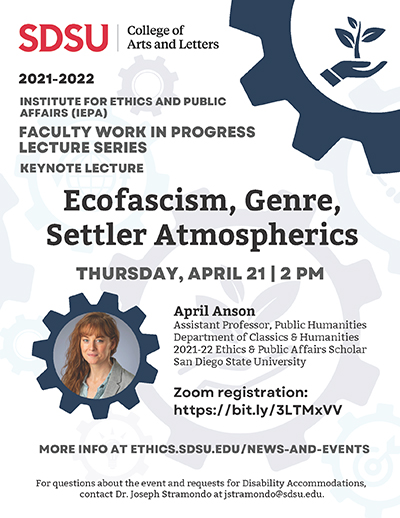 Ecofascism, Genre, Settler Atmospherics
Ecofascism, Genre, Settler Atmospherics
Dr. April Anson, Assistant Professor of Public Humanities,
Department of Classics and Humanities,
Core faculty, Institute for Ethics and Public Affairs
Affiliate faculty, American Indian Studies and Digital Humanities
San Diego State University
Thursday, April 21, 2pm
The increasing popularity of environmental appeals to justify violence, or ecofascism, testifies to the critical narrative concerns accompanying contemporary climate change which is the foci of my first book, Unfenceable: Ecofascism, Genre, and the Sovereignties that Will Save Us. Unfenceable traces the representational challenges of climate change to an enduring, yet unacknowledged, tradition of American ecofascism. Through the methods of literary analysis, Unfenceable amends scholarship that originates ecofascism with the Green Nazis (Biehl and Staudenmeier 2011; Minna Stern 2019), finding ecofascist sentiment in thinkers like Ralph Waldo Emerson and Frederick Jackson Turner who had a profound influence on German romanticism and its later iterations in the Third Reich. More importantly, these figures reveal a white-nature tradition that spans the political spectrum, anticipating the ways the term “ecofascism” has been used to derogatorily describe twentieth and twenty-first century far-left movements yet is increasingly embraced by the far-right. However, in the same times and places as canonical American environmental figures like Emerson and Turner, Indigenous authors such as Pequot William Apess, Cherokee John Rollin Ridge, and Neshnabé Simon Pokagon use the apocalypse genre to depict decolonial visions of environmental justice. Unfenceable theorizes this reparative use of literary genre for scientists and humanists alike, recovering nineteenth-century Indigenous American environmental justice movements and re-envisioning a literary politics of climate change out of that recovery. This talk will connect contemporary ecofascist violence with the late 19thcentury frontier apocalypticism, arguing that climate chaos demands we reckon with the racial politics of literary genre and learn from literary traditions that have long envisioned the certainty of land return.
Dr. April Anson is an Assistant Professor of Public Humanities at San Diego State University, core faculty for the Institute for Ethics and Public Policy, and affiliate faculty in American Indian Studies. She is also one of the 2021-22 Ethics and Public Affairs Scholars. Her research explores the historical and ongoing connections between climate change, white supremacy, and the American environmental imagination while also attending to Indigenous environmental justice traditions that eclipse those relations. Dr. Anson was a Mellon postdoctoral fellow at the University of Pennsylvania with the Penn Program in Environmental Humanities and her work has appeared or is forthcoming in boundary 2, Resilience, Environmental History, Western American Literature, and others. In all, she remains committed to anti-racist and anti-colonial knowledge production and social movements.
2021-22 Virtual Colloquium Series
Aids Crisis in Japan
Chris Lowy, PhD
Visiting Assistant Professor of Japanese, Macalester College
(Assistant Professor of Japanese Studies at Carnegie Mellon University starting Fall 22)
Tuesday, April 12, 2022, 1 pm
As preventative strategies and clinical treatment for HIV/AIDS have improved in recent years, the traumatic sense of fear and the widespread panic of the early days of the AIDS crisis has become history for those who did not live through them. One consequence has been a decline in the attention paid to “AIDS literature.” While Western AIDS literature is now widely configured as a thematic genre in academic discourse, little has been said about AIDS literature in Japan. Many Japanese writers only indirectly referenced HIV/AIDS, puzzling critics and readers alike; and mortality statistics did not inspire the level of hysteria as in North America and Western Europe. This does not mean, however, that the terror and grief in Japan was not as strong as in the Western world. In this talk I discuss early depictions from Japan of HIV/AIDS from a variety of media, including fiction, television, manga, gay magazines, and poetry. In the second half of my presentation I focus on a collection of Japanese poetry called Bathhouse by Ishii Tatsuhiko and think about the potentiality contained within Ishii’s AIDS poems.
About the speaker
Chris Lowy received his PhD in modern Japanese literature from the University of Washington in 2021. He is currently a Visiting Assistant Professor of Japanese at Macalester College in St. Paul, Minnesota. Beginning in August 2022, Lowy will be an assistant professor of Japanese Studies at Carnegie Mellon University. He teaches courses on contemporary Japanese literature, queer literature, contemporary thought, and literary representations of illness and disease. His research focuses on two main topics: the role of written language in Japanese literature and depictions of HIV/AIDS in Japanese literature from the 1980s and 1990s. Publications include “Thoughts on Japanese AIDS Literature During the Coronavirus Panic,” Gendai shisо̄ (05.2020).
2021-2022 Faculty Work In Progress Lecture Series
Bad Air, Built Environments, and the Brookes
Dr. Diana Leong, Assistant Professor, Department of English and Comparative Literature, San Diego State University
Monday, March 14 at 10 am
This presentation will look at the infamous 1788 cross-section of the slave ship Brookes – detailing the brutal arrangement of captive Africans within the hold – and the rich set of writings it has generated in the fields of abolition and visual studies. Because this scholarly literature largely discusses the Brookes image with respect to its manipulation of white racial sentiment, it has so far overlooked the image as evidence of the ecological dimensions of racial slavery and the slave trade. Using the Brookes as a point of departure, I investigate the slave ship as a built environment that anticipates later environmental justice concerns with public health zoning laws and sanitation, with the former having a genealogical link to slave ship stowage regulations.
2021-22 Virtual Colloquium Series
Those Stories We Carry
Guest Lecture by Zeina Salame, Ph.D.
Tuesday, March 8, 2022 at 2pm
2:00 p.m.
Via Zoom
Zeina Salame's monograph, "Carried In One Woman - Reflections on Arab American Female Solo Performance" centers on themes of "home" and the creative value of embodied generational knowledge, heritage, and intersectionality in performance aesthetics. In this talk, Salame describes her journey toward finding her scholarly direction through observing her own longing for solidarity in creative arts spaces and how that longing was also enmeshed with much of her lived experience as an Arab American Woman. She shares how solo performance offered that sense of community, ways in which the solo body in performance communicates that which it carries, and the power of this distinctly human aesthetic form to inspire radical change toward equity in the broader field of U.S. theatre. She argues for advancement in the validation of the intertwining of personal narrative with scholarly discourse on theatre and beyond. This talk bridges into participatory engagement with generative storytelling and community building practice, inviting out and nurturing what stories emerge from the unique gathering of audience participants in the virtual space on that day.
About the Speaker
Zeina Salame is a postdoctoral fellow in Theatre and Dance at the University of Vermont. She holds a PhD in Theatre Arts from the University of Oregon. Her dissertation, "Carried In One Woman - Reflections on Arab American Female Solo Performance" centers on themes of "home" and the creative value of embodied generational knowledge, heritage, and intersectionality in performance aesthetics. Some of her recent writing on theatre has been published on Howlround Theatre Commons, Etudes, Al Jadid, and in the Encyclopedia of Women & Islamic Cultures. In addition to her work as an educator and scholar, Zeina is a director, actor, and applied theatre practitioner. Several recent creative collaborations include work with Artists Repertory Theatre’s Mercury Company, the Guthrie Theater’s Level Nine with New Arab American Theater Works, Commonwealth Theatre Center, and the National Institute for Directing and Ensemble Creation with Pangea World Theater and Art2Action. She is a co-founder and an artistic team member of Jacksonville, Florida based The 5 & Dime, A Theatre Company.
Community Film Screening and Q&A on Becoming Helen Keller
Sunday, February 13
Film Screening @9 am
Q&A @11 am
Join us for a film screening of the documentary film Becoming Helen Keller, followed by a discussion with Dr. Beth Haller, author/editor of Byline of Hope: Collected Newspaper and Magazine Writing of Helen Keller (2015) and Professor Emerita at Towson University.
Joseph Stramondo will moderate a panel with disability
media experts, Beth Haller and Tari Hartman Squire.
The film is the newest PBS American Masters production and highlights the under-examined aspects of Helen Keller's life,documenting her commitment to social justice, disability rights, women’s rights, voting rights, civil rights, disabled veterans, support for NAACP and the ACLU, and many other progressive causes.
Part of San Diego's Ohr Shalom Synagogue's celebration of Disability Awareness, Acceptance, and Inclusion Month.
Free and open to the public.
*Note that the film will also be streamed for PBS Passport Member watch on PBS:
- Sunday, February 6 at 7:00pm &
- Saturday, February 12 at 8:00pm
2021-2022 Faculty Work Series: Towards an Ideal of Political Maturity
Towards an Ideal of Political Maturity
Dr. Farid Abdel-Nour, Professor and Department Chair, Department of Political Science, San Diego State University
Thursday, February 17 at 2 pm
In his essay “Voluntary acts and responsible agents,” Bernard Williams states that the ideal of mature agency is not a political one. In this presentation, I argue contra Williams that his ideal of mature agency is in fact an important resource for thinking about political responsibility. Despite the dizzying complexity of the modern state and the impersonal nature of its political forces, we do exercise agency in it. The relationship between these exercises of our agency—we ordinary people—and political outcomes attributable to the state, is indirect and mediated. But it is real. Without what we do the state is inconceivable and would cease to exist. But since the political outcomes we make possible by means of the minimal exercises of our agency lie far beyond the reach of our deliberation and control, how are we to take the concrete roles we play in state politics seriously? Maturity on the model of Williams’ ideal is called for in this context. We ordinary people can only seriously come to terms with the political agency we exercise in the complex structures and processes of the modern state, if we are willing to live up to the standard of Williams’s demanding ideal of mature agency and hold ourselves responsible for what no institutions of control and cohesion and no “system” of morality can reasonably hold us responsible for.
2021-2022 Faculty Work In Progress Lecture Series
Why Restorative Justice? RJ as Harm Reduction Amid Racial Injustice
Dr. JP Anderson, Assistant Professor of Race and Public Law, Department of Political Science, San Diego State University
Monday, December 6 at 2 pm
The brutal murder of George Floyd brought the issue of systemic racism in criminal justice to the forefront of American politics. The U.S. has since begun a process of reforms aimed at curbing the worst instances of police brutality. Nonetheless, the routine day-to-day implementation of criminal justice, even in the absence of overt brutality, inflicts considerable and potentially unnecessary harm upon millions of Americans each year, especially members of Black American communities.
Whereas some argue this harm is an unfortunate necessity, others have suggested that total penal abolition and subsequent institutional replacement is an urgent requirement of racial justice. Indeed, the moral argument for abolition has substantial merit in light of America's racial history. However, the political environment of the United States is far from amenable to such momentous social change.
This talk considers an intermediary alternative to penal abolition that draws upon the concept of "harm reduction." Expanding the use of Restorative Justice in lieu of incarceration can be justified as a process of harm reduction applied to the systemic racism of the American State. However, to conceptualize Restorative Justice as harm reduction in this way requires an honest accounting of the ethical dilemmas inherent to restorative practices. These and other ethical concerns will be addressed.
Dr. April Anson interviews Jessica Hurley for Edge Effects magazine
IEPA's core faculty member and SDSU Assistant Professor of Public Humanities, Dr. April Anson, recently appeared on Edge Effects, a digital magazine about environmental issues. Graduate students produce the magazine at the Center for Culture, History, and Environment (CHE), a research center within the Nelson Institute for Environmental Studies at the University of Wisconsin–Madison. In "American Apocalyptic: A Conversation with Jessica Hurley," Anson conducts a podcast-style interview with Hurley, Assistant Professor of English at George Mason University, about her new book Infrastructures of Apocalypse: American Literature and the Nuclear Complex. Hear the interview/read the transcript.
Stramondo's new article in the journal Surgery
The IEPA’s Director, Dr. Joseph Stramondo, has recently published a new article, “A Critique of the Curative Imperative” in the journal Surgery. Surgery has been published for 66 years and is the official journal of 3 different professional organizations, including: the Society for University Surgeons, the Central Surgical Association, and the American Association of Endocrine Surgeons. The article is one of the first of a series addressing disability and surgery that is being developed by Dr. Jason Keune, who is an Assistant Professor in the Department of Surgery and Director of the Bander Center for Medical Business Ethics at the Saint Louis University School of Medicine. Read/download the article free for 50 days.
IEPA Director's presentations on ethics and the COVID-19 pandemic
The IEPA’s Director, Dr. Joseph Stramondo, has recently been presenting some of his scholarly work on the ethical implications of the COVID-19 pandemic. On November 5 he presented his paper “(Dis)Valuing Disabled Lives in Times of Crisis” at Georgetown University’s Disability Justice in Emergency Conditions conference. The event was sponsored by Georgetown’s Disability Studies Program and Department of Philosophy and the proceedings will be the core of a new edited volume of the same name, which is under consideration at Cambridge University Press.
In Addition, on November 12, Dr. Stramondo will present his paper “Vulnerability to COVID-19 and the Moral Perniciousness of Institutional Long Term Care” for Michigan State University Department of Philosophy’s colloquium series. This paper is loosely based on a chapter of his co-authored book Learning How to Look in Bioethics: Race, Gender, Disability and Sexuality in Bioethics, which is currently under contract with Routledge. It is also notable that this event will be a kind of homecoming for Dr. Stramondo, who received his PhD from MSU in 2015.
Raechel Dumas' forthcoming publication
Join us in congratulating IEPA’s core faculty member Dr. Raechel Dumas on her forthcoming scholarly article "'She Was Raised on Blood': Technological Anxieties, Animal Intimacies, and Evolutionary Impulses in Marebito." The paper will appear in the journal English Language Notes, which describes itself as a leading venue for “interdisciplinary and collaborative work among literary scholarship and fields as disparate as theology, fine arts, history, geography, philosophy, and science.” Dr. Dumas’ work will be part of a special issue of the journal addressing the theme of “Trauma and Horror,” edited by Dr. Kelly Hurly of the University of Colorado. Dr. Dumas is an Associate Professor in SDSU’s Department of History.
IEPA Associate Director presents at Humboldt’s Decolonizing Sustainability Series
On November 5, Dr. Esme Murdock, the IEPA’s Associate Director, presented at Humboldt State University’s Decolonizing Sustainability Series. Her session was titled “Indigenous Knowledge Cannot Be Treated as a Back Up Plan: Indigenous Collaboration, Sustainability, & Decolonization.” Dr. Murdock is a philosopher by training but now takes an interdisciplinary approach to her scholarship as she serves as an Assistant Professor of American Indian Studies at SDSU. She has published widely in scholarly journals and is now drafting the manuscript for her first book, titled Blood, Bone, & Land.
2021-22 Virtual Colloquium Series
Abolish Border Imperialism: Migration, Racial Capitalism, and Transnational Solidarities
Guest Lecture by Harsha Walia
Wednesday, November 10, 2021
1-2:30 p.m.
Harsha Walia is an organizer and writer who has been involved in community-based grassroots migrant justice, feminist, anti-racist, abolitionist, Indigenous solidarity, anti-capitalist, Palestinian liberation, and anti-imperialist movements for two decades. She is formally trained in law and is the award-winning author of "Undoing Border Imperialism" (AK Press, 2013) and "Border and Rule: Global Migration, Capitalism, and the Rise of Racist Nationalism" (Haymarket, 2021).
Tragic Choices: Disability, Triage, and Equity Amidst a Global Pandemic
Dr. Joseph Stramondo, the IEPA's director, has published a new scholarly paper, "Tragic Choices: Disability, Triage, and Equity Amidst a Global Pandemic" in the inaugural issue of the newly launched Journal of Philosophy of Disability. This paper was an invited contribution that synthesizes a series of three posts he wrote in the early days of the COVID-19 pandemic for the scholarly blog bioethics.net.
In the paper, Stramondo argues against accepting ableist biases in Crisis Standards of Care for rationing medical resources like ICU beds and ventilators during a public health emergency.
It is also notable that Stramondo sits on the editorial board of this new journal, which is the first to focus exclusively on this quickly emerging branch of philosophical inquiry.
Disability Justice as Praxis
The IEPA is co-sponsoring, along with the Disability Employee Resource Group and the Professors of Equity, a workshop series for instructional faculty called Disability Justice as Praxis.This three part series will explore how insights from the disability justice movement can and should impact pedagogy in higher education. It will be running Fridays Oct 8, Oct 29, and Nov 19, all from 11:00am to 12:30pm.
Eugenics: Historical Practice to Present Day Technology
The IEPA's Director, Dr. Joseph Stramondo, was recently commissioned to write a short essay on how the eugenics movement of the past impacts the development of present biotechnologies. In "Eugenics: Historical Practice to Present Day Technology," Stramondo argues that technologists and policy makers ought to prioritize the the development and distribution of technology that helps disabled people thrive as equal members of society rather than scientific discovery that continues to advance the goals of the eugenics movement.
The essay was published on the Disability and Philanthropy Forum, which is a project of the Presidents' Council on Disability Inclusion in Philanthropy. The Presidents' Council was founded by Presidents of the Ford and Robert Wood Johnson Foundations and currently has 17 member organizations who have committed to advancing disability inclusion in funding practices.
2021-22 Virtual Colloquium Series
Acuerpar or giving one’s body: Feminist solidarity beyond empathic colonization
María José Méndez, Ph.D.
Assistant Professor of Political Science
University of Toronto
October 29, 2021
1 p.m.
The verb acuerpar—literally, to give the body—has emerged as a central political term in the vocabulary of feminist resistance in Latin America. It names the collective and quotidian actions that bodies take to hold space for each other in the face of rampant gendered and racialized violence. Against forms of solidarity that rely on a language of empathic identification—putting oneself in another’s shoes—and that often collude with colonial projects, acuerpar indexes a form of political action that calls us to stand side by side in our own shoes. In this talk, Méndez argues for the importance of centering acuerpar in feminist praxis. She does so by reflecting on the embodied support that took place at a feminist encampment in Honduras demanding justice for the indigenous Lenca leader Berta Cáceres.
About María
María José Méndez is a Junior Fellow at the Harvard Society of Fellows and assistant professor in the Political Science department at the University of Toronto. Her current book project examines the gendered political and economic entanglements of transnational gang violence in Central America. She is the chair of Witness for Peace-Midwest, a US-based grassroots organization that campaigns for peace, justice, and sustainable economies in Latin America.
2021-22 Virtual Colloquium Series
Envy and Prejudice: The Role of Envy in a Racially Divided Public Sphere
Sara Protasi, Ph.D.
Associate Professor of Philosophy
University of Puget Sound
Monday Sept. 20, 2021
4 p.m.
In recent times philosophers of emotions have started investigating the role of anger, hatred, fear, and contempt in relation to racism and racial injustice. Envy, however, has been so far ignored. In this talk I start remedying this lacuna by asking what role group envy may play in racial relations. I suggest that different forms of malicious envy play a central role in anti-Asian racism, in particular, and explore the possibility that more benign forms of envy may drive positive, if limited, political change.
About Sara
Sara Protasi (Ph.D., Yale, and University of Bologna) is Associate Professor in Philosophy at University of Puget Sound. Her primary research interests are in moral psychology, ethics, and aesthetics. She has published on love, envy, beauty, and pornography in peer-reviewed journals and edited volumes. Her monograph The Philosophy of Envy was published by Cambridge University Press in 2021. Among other projects, she is currently working on editing The Moral Psychology of Envy, forthcoming with Rowman and Littlefield in 2022. For more information, see: saraprotasi.weebly.com.
IEPA Director Featured in COVID-19 Article
Recently, the IEPA’s Director, Dr. Joseph Stramondo, was interviewed for an article about the ethics of COVID-19 vaccination appearing in the San Diego Union Tribune. The article “COVID-19 vaccine boosters haven’t been approved. Some San Diegans are getting them anyway” was written by science writer Jonathan Wosen and explores the scientific and ethical grounds for providing booster shots to those that have already received the Pfizer vaccine.
Stramondo specifically argued that social justice considerations ought to be front and center when thinking about the ethics of vaccine boosters, “There’s good grounds for ensuring that these groups have access to vaccine boosters, says San Diego State University bioethicist Joseph Stramondo, citing both emerging data on the Delta variant and longstanding health disparities. ‘Being a migrant worker or being unhoused produces greater risk in general from the virus because you’re more likely to have other kinds of comorbidities that make (COVID-19) more dangerous for you,’ he said. ‘I think that’s an added reason to prioritize them for a booster.’”
Call for Proposals: Ethics and Public Affairs Scholar Program
The Institute for Ethics and Public Affairs (IEPA) at SDSU seeks applicants for its Ethics and Public Affairs Scholar Program. The Ethics and Public Affairs Scholar will be a non-tenured, tenure track faculty member of SDSU’s College of Arts and Letters with an emerging record of outstanding scholarly or artistic achievement. Their research program or artistic trajectory will demonstrate substantial engagement with the ethical salience of some feature of public life.
The Ethics and Public Affairs Scholar Program will provide support to this individual in the form of assigned time to allow them to further develop their projects in this area. Specifically, three units of assigned time will be awarded to the Ethics and Public Affairs Scholar, which they will be expected to use over one semester to complete some sort of research or artistic project that has direct bearing on moral problems that arise from current events in their historical or cultural contexts. During the same academic year as they are awarded this assigned time, the Ethics and Public Affairs Scholar will offer a public presentation of their project as part of the IEPA’s Faculty Work in Progress Series.
As an interdisciplinary research center, we invite applicants who engage various analytical methods to grapple with ethical tensions at both theoretical and practical levels. However, all projects must be focused on addressing normative problems, rather than offering purely empirical descriptions. While we will consider projects addressing any normative question of public interest, projects engaging with the following three research areas, which are the focus of the IEPA, will be given priority:
- Environmental Ethics
- Bioethics
- Equity and Social Justice
To apply, please send the following to Dr. Joseph Stramondo ([email protected], Associate Professor of Philosophy and Director of the IEPA) with the subject line “Ethics and Public Affairs Scholar Application” by October 1, 2021:
- A current Curriculum Vitae
- A one-paragraph statement describing how your research or artistic interests engage with questions regarding ethics and public life.
- A one-paragraph description of the project you would complete as an Ethics and Public Affairs Scholar
Call for Participants: Faculty Work in Progress Presentation Series
The Institute for Ethics and Public Affairs (IEPA) seeks participants for its first Faculty Work in Progress Presentation Series (FWIPPS). The FWIPPS will be comprised of presentations from both junior and senior faculty members from SDSU’s College of Arts and Letters. Each presentation must demonstrate substantial engagement with the ethical salience of some feature of public life.
Namely, participants’ research or artistic projects must have direct bearing on the intersection of moral problems that arise from current events, in their historical or cultural contexts. As an interdisciplinary research center, we invite presenters who deploy the full range of analytical methods to grapple with ethical tensions at both the theoretical and practical levels. However, all projects must be focused on addressing normative problems, rather than offering purely empirical descriptions. Participants engaging with the following three research areas, which are the focus of the IEPA, will be given priority:
- Environmental Ethics
- Bioethics
- Equity and Social Justice
To participate, please send the following to Dr. Joseph Stramondo ([email protected], Associate Professor of Philosophy and Director of the IEPA) with the subject line “IEPA Faculty Work in Progress Presentation Series” by October 1, 2021.
- A title of your presentation
- A one-paragraph abstract of the presentation
- A list of dates, days, or times during the 21-22 Academic Year that you would NOT be available to present as part of the FWIPPS.
IEPA Associate Director Dr. Esme Murdock Gives Lecture at the National Student Leadership Conference
IEPA’s Associate Director, Dr Esme Murdock, spoke in July 2021, at the University of San Diego as part of the program for the National Student Leadership Conference. The National Student Leadership Conference is a pre-college enrichment program for high school students from across the country. Dr. Murdock’s talk focused on her research in environmental justice and environmental colonization. The students in attendance were exploring future careers in the environmental sciences.
Check out a brief interview with Dr. Murdock on the NSLC’s YouTube channel.
Screening and Panel Discussion of River of Gold
January 29, 2019
Panelists: Sarah duPont (Founder Amazon Aid, Producer and Co-Director of "River of Gold"), Christina T. Miller (Co-Founder of Ethical Metalsmiths, Sustainability Consultant), Alexandra Hart (President, Ethical Metalsmiths), and Mark Wheeler (Director, SDSU Institute of Ethics and Public Affairs, Chair SDSU Philosophy)
"River of Gold" is a documentary film about illegal and destructive gold mining in the Peruvian Amazon. The film was created by Amazon Aid Foundation. A no-host dinner/drinks will be held across campus at Eureka after the panel discussion at Eureka on campus, (5140 College Ave Suite 111, San Diego, CA 92115).
Screening is sponsored by The SDSU Institute for Ethics and Public Affairs, Ethical Metalsmiths, and the Women's Jewelry Association, San Diego Chapter.
Film Screening and Q&A: “The Most Dangerous Man in America: Daniel Ellsberg and The Pentagon Papers”
September 11, 2018
Did you love “The Post” with Tom Hanks and Meryl Streep? Want to learn more about Daniel Ellsberg and the Pentagon Papers before he visits SDSU next month, and connect it to what is happening today? Come join us!
Daniel Ellsberg is coming to SDSU on October 2. Come learn about him and his role in history. Philosophy Professor Mark Wheeler will lead a Q & A session with John Martin, who covered Ellsberg’s pre-trial hearings in 1973 and was an ABC News National Correspondent from 1975-2002, and Professor Pierre Asselin, Dwight E. Stanford Chair of U.S. Foreign Relations, after the screening of the Academy Award nominated documentary “The Most Dangerous Man in America: Daniel Ellsberg and the Pentagon Papers.”
Presented by the Institute for Ethics & Public Affairs, the Departments of History, Philosophy, and Political Science, ISCOR, and the Dwight E. Stanford Chair in U.S. Foreign Relations.
Daniel Ellsberg: The Pentagon Papers, Whistleblowing, and Doomsday
October 2, 2018
Ellsberg is the author of three books: The Doomsday Machine: Confessions of a Nuclear War Planner (2017,), Secrets: A Memoir of Vietnam and the Pentagon Papers (2002,) Risk, Ambiguity and Decision (2001,) and Papers on the War (1971). In December 2006 he was awarded the 2006 Right Livelihood Award, in Stockholm, Sweden, “. . for putting peace and truth first, at considerable personal risk, and dedicating his life to inspiring others to follow his example.” Read his full bio.
The event is free and open to the public.
Co-sponsored with the College of Arts & Letters, the Departments of Philosophy, History, and Political Science, and Dwight E. Stanford Chair in American Foreign Relations
A Conversation with Chelsea Manning
April 9, 2018
As an intelligence analyst for the U.S. Department of Defense, Chelsea Manning disclosed classified documents to WikiLeaks that revealed human rights abuses and corruption connected to the U.S. wars in Iraq and Afghanistan. She was convicted and sentenced to 35 years in a military prison, but released in 2017 after President Obama commuted her sentence. Now an advocate for government transparency, Manning will speak about topics including national security and democracy, artificial intelligence (AI) and resistance in the age of AI; activism and protest; and the intersection of technology and people’s lives.
Moderator: Prof. Mark Wheeler
Free and Open to the Public
Sponsored by College of Arts and Letters, Love Library, Academic Affairs, Provost's Office, Institute of Ethics and Public Affairs, Political Science Department, MALAS, History Department, the Pride Center
Spring Colloquium Series in Philosophy
No Race, No Ethics: How We Became Way Too Cool
April 2, 2018
Dr. Shannon Winnubst
Ohio State University
As chants of resistance fill US streets more and more, how might we claim an ethical ground amidst the intensely politicized discourses of contemporary social problems? This lecture will explore this quandary through the historical transformations in our relationships to social difference (categories such as race, gender, sexuality, dis/ability, and so on). As we find ourselves amidst a cultural erasure of the histories and meanings attached to “race,” we may also find ourselves without any tether back to an ethical stance: the lecture will conclude with speculations on how to reactivate race in an effort to reclaim ethics.
Shannon Winnubst is Professor and Chair of the Department of Women’s, Gender, and Sexuality Studies at Ohio State University and co-editor of PhiloSOPHIA: A Journal of Continental Feminism (SUNY Press). She specializes in 20th century French philosophy as well feminist, race, and queer theory. She is the author of Way Too Cool: Selling Out Race & Ethics (Columbia UP: 2015) and Queering Freedom (Indiana UP: 2006).
Sponsored by the Institute for Ethics and Public Affairs and the Department of Philosophy
Imagining Europe
The College of Arts and Letters and the Institute for Ethics and Public Affairs present:
A talk by historian Timothy Snyder, Professor of History at Yale University, about his 2017 book On Tyranny: Twenty Lessons from the Twentieth Century
March 19, 2018
Book signing to follow
Professor Snyder is an internationally renowned historian whose scholarship focuses on Europe and whose forthcoming book is The Road to Unfreedom: Russia, Europe, America. Among his many books are the acclaimed Bloodlands: Europe between Hitler and Stalin (2010) and Black Earth: The Holocaust as History and Warning (2015). Translated into 33 languages, Bloodlands has won twelve awards, including a Literature Award from the American Academy of Arts and Letters, and the Hannah Arendt Prize in Political Thought. The widely translated Black Earth has also received multiple honors, including an award from the Dutch Auschwitz Committee. Professor Snyder’s most recent publication, On Tyranny: Twenty Lessons from the Twentieth Century (2017), offers a series of parables, at once chilling and inspiring, about the dangers facing countries across the globe where democratic ideals are imperiled.
This event is free and open to the public!
Professor Snyder’s lecture is part of this year’s Common Experience program and has been sponsored by the College of Arts and Letters and the SDSU Institute for Ethics and Public Affairs. The organizers of Imagining Europe are also grateful for the support of European Studies, German Studies, Jewish Studies, and the Master of Arts in Liberal Arts and Sciences; and for the help of the SDSU Press, the Department of English and Comparative Literature, the Department of History, and the Department of Political Science. Lecture arranged courtesy of Adventures by the Book.
Fall Colloquium Series in Philosophy
Grasping Power: Deaf Ethics and Signed Language Interpreting
October 17, 2017
Teresa Blankmeyer Burke, PhD
Associate Professor of Philosophy Gallaudet University
Public perceptions by hearing persons often frame the signed language interpreter as engaging in a laudatory activity. While the profession of signed language interpreting provides a useful and important service of communication access, default assumptions and communication structures presumed by nonsigning hearing persons contribute to hidden labor performed by deaf persons engaging in interpreted interaction. This paper is divided into two parts: it begins with a description of wildly different public perceptions of two signed language interpreters during Hurricane Irma and offers an explanation for this phenomenon, the second part builds on this explanation and identifies key components of the hidden labor performed by deaf consumers of interpreting services, and the final section provides a philosophical analysis of this labor.
Sponsored by the Department of Philosophy, Institute for Ethics & Public Affairs, Department of Administration, Rehabilitation, & Postsecondary Education, Dual Language and English Learner Education, Department and Laboratory for Language and Cognitive Neuroscience

